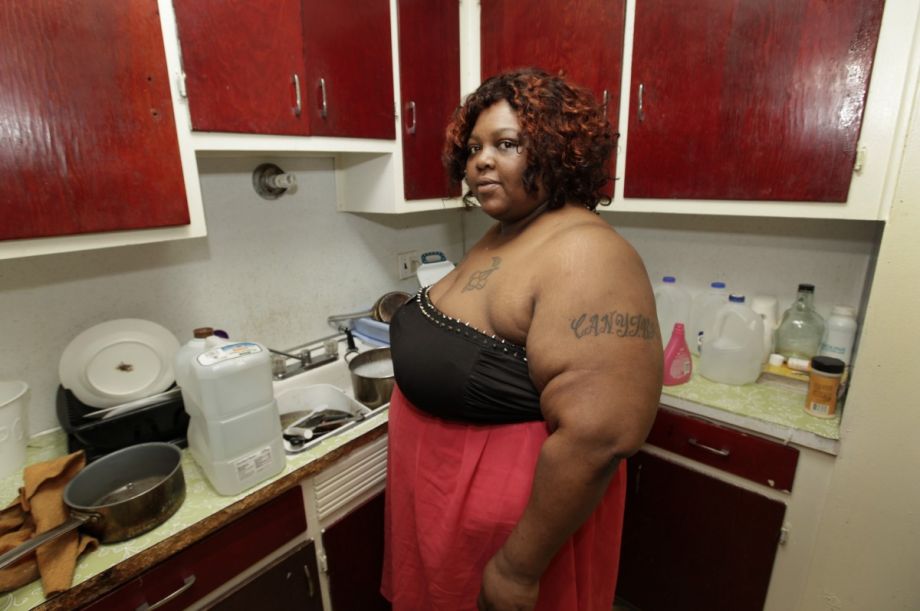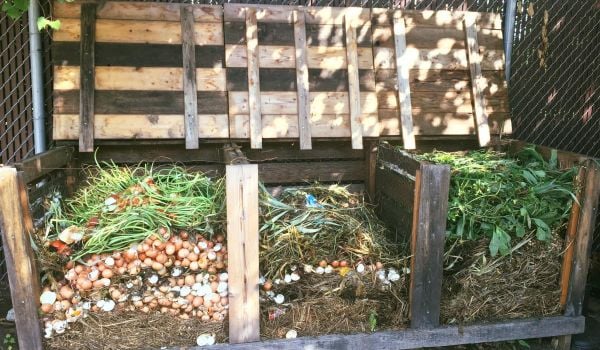Two weeks ago, there was a knock on the front door of Nicole Hill, a 41-year-old woman in northwest Detroit. It was after 2 a.m., but she was awake, searching the Internet for help with her outlandishly large water bill. She said she paid about $3,000 to the Detroit Water and Sewerage Department over the past two years, but her outstanding bill is $5,400. As a full-time community college student who receives disability income, she can’t pay it. Six weeks ago, DWSD, cut off water to the three-bedroom home where she lives with her three children. She sent her kids to stay with others, each in a different home. Her youngest was with her aunt.
“Who’s there?” Hill called.
“It’s an emergency!” came a voice.
“Oh my god,” she thought. “One of my kids is dead.”
In fact, her seven-year-old daughter was at her doorstep, along with Hill’s aunt and two police officers. In the middle of the night, her daughter had crept out of the house she was staying in and asked a stranger on the street to bring her to her mother’s home. Hill asked her daughter why, if she wanted to come home, she hadn’t woken her relatives. The girl eyed the police officers. “Because of the thing.”
The water shut-off. The girl didn’t want to say it in front of the police because she had heard a Department of Human Services representative warn Hill that if she didn’t have water, “they’ll take your kids.”
Over on the east side of town, on Yorkshire Road, Barbara Coleman has been without water for two weeks. At age 66, she depends on $950 a month in social security for her income. But that doesn’t go far, especially since she’s responsible for caring for her unemployed 28-year-old son and 10-year-old grandson. Both live with her in a home where rent alone costs her $750 a month. Coleman’s bill ballooned to $6,000 before her taps were turned off. She, her son and her grandson are now staying with one of Coleman’s daughters while she tries to navigate assistance through a local non-profit, the Wayne Metropolitan Community Action Agency.
In Detroit, water shut-offs due to nonpayment escalated over the past few months as DWSD attempts to recoup more than $90 million in debts owed by water customers: 79,000 residential and 11,000 commercial. Shut-offs are targeting customers who are at least 60 days late on their bill, and owe at least $150. They began after the spring thaw, when burst pipes were no longer a possible consequence of the shut-offs.
While shut-offs are fairly standard practice in utility services, the newfound push coincides with DWSD’s unique position in the city’s municipal bankruptcy. The ongoing negotiations in the bankruptcy trial may lead to DWSD, a city department, being privatized, leased or turned into a public-private enterprise. Emergency Manager Kevyn Orr is reviewing privatization bids right now. (An appointee of the governor to manage the city’s fiscal crisis, Orr has the power of both mayor and city council.) As activists point out, DWSD is a much more appealing purchase if it loses its debt.
DWSD provides water to four million people across eight counties. With a 1,079-square-mile service area, encompassing more than 40 percent of the state’s population, it is one of the largest water systems in the nation. The majority of the region is sold water wholesale; Detroiters are DWSD’s only retail customers. Homeowners are responsible for water bills, unless a landlord stipulates otherwise in a landlord-tenant agreement — which is the case for both Hill and Coleman. DWSD is, by law, a non-profit, and it has struggled to manage fixed costs of service while water sales declined steadily over the last decade, according to Darryl Latimer, DWSD’s deputy director and chief customer service officer. “We think (the sales decline is due to) a combination of industry leaving this area, and people who don’t use water the same way anymore,” he said.
Besides the decline in irrigation practices and the rise in conservation tools and habits, Latimer said, “you can’t underestimate the effect bottled water has had. People don’t use tap water anymore.”
According to the U.S. Environmental Protection Agency, the last century has seen a tenfold increase in the average amount of water that Americans use each day. Yet water bills for the average household are about $43 a month — the lowest burden on household income among comparable developed countries. In Detroit, however, the average water bill is higher: $75 a month for a four-person household.
Hill moved to her current address in 2009. She said her landlords signed affidavits confirming her move and requesting water to be shut off at the old address. But her bill jumped from $60-$70 a month to $240-$250 a month. For Hill, her new rate equaled more than half of what she pays in rent ($400). Squatters moved into her former house, and Hill found she had two active water account numbers.
What followed was an escalating tangle of inexplicable charges and bureaucratic confusion. Customer service’s advice? “Ma’am you need to learn to conserve water.” Hill has had no water since May 16th.
On June 18th, activists with four groups — Food & Water Watch, The Blue Planet Project, the Michigan Welfare Rights Organization, and the Detroit People’s Water Board — filed a report with the United Nations, asserting water is a human right and requesting intervention. Three UN special rapporteurs (experts appointed by the Human Rights Council to investigate violations) responded. Catarina de Albuquerque, special rapporteur on the right to water and sanitation, said in a June 25th statement that “Disconnections due to non-payment are only permissible if it can be shown that the resident is able to pay but is not paying. In other words, when there is genuine inability to pay, human rights simply forbids disconnections.”
At the same time, water shut-offs are somewhat effective: DWSD said that more than 60 percent of customers pay their bills in full within 48 hours and have their water reinstated. Many, Latimer said, can afford to pay their bill and are simply not doing it. The shut-offs, he said, are an attempt to push the water bill up on the priority list, alongside other basic utilities.
“I think that (the water story) received a lot of national attention because some folks have looked at the numbers, and they have attached a poor person’s face to it,” Latimer said. “For those customers who are having challenges, we will work [with] those. But … when you see close to 50 percent of customers in delinquency, you’re telling me that 50 percent of the people in Detroit can’t pay their bill? That’s not accurate.”
DWSD does offer a budget payment plan for low-income customers, but it requires an upfront payment of at least 30 percent of the total debt. For some, bills have gotten so high that this is a struggle. In Hill’s case, she said, the upfront payment that DWSD wants is about $1,700, which she doesn’t have. Coleman said that she went to the water department before the shutoff and tried to pay a portion of her bill and DWSD refused the small amount she had. “They wouldn’t accept it,” she said. “They wanted more. I think they wanted over $2,000 all at once.”
While the two women work on getting their water turned back on, they are forced to make tough compromises. Coleman appreciates being able to stay with her daughter but, she said, “I want to go back home. I’m used to being on my own.”
For Hill, friends have invited her over to shower or fill jugs. She uses a trashcan as a rain barrel. She recycles dishwater to use again as mop water, or to pour into the toilet to make it flush. When she uses the bathroom without water, she says, “I literally try to do it military style in my small trash can: Bind it up and throw it out.”
Her kids, spread out in different homes around the city, are worried about their mother. Her son, staying around the corner, checks in on her frequently. Her 14-year-old daughter filled a backpack with two liters of water and rode them over on her bike. “They feel like they have to protect me,” Hill said.

Anna Clark is a journalist in Detroit. Her writing has appeared in Elle Magazine, the New York Times, Politico, the Columbia Journalism Review, Next City and other publications. Anna edited A Detroit Anthology, a Michigan Notable Book. She has been a Fulbright fellow in Nairobi, Kenya and a Knight-Wallace journalism fellow at the University of Michigan. She is also the author of THE POISONED CITY: Flint’s Water and the American Urban Tragedy, published by Metropolitan Books in 2018.
Follow Anna .(JavaScript must be enabled to view this email address)




_600_350_80_s_c1.JPEG)











